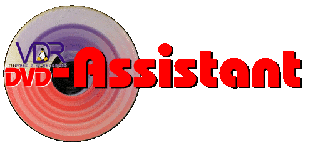

an Assistent not limited to conversion of VDR-recordings to DVD-images

build VdrAssistant from sources
I'll use the repository as a backup on long term development jobs, which means, you can't expect, that the repository contains a stable release. It rarely will - and it is not asured, that the repository will compile without errors.
My desktop is a Linux-system, which means, that I naturally use scripting with bash and perl for development. So if you want to build VdrAssistant on a windows host, you'll have to provide those scripting support (i.e. cygwin).
... so if I couldn't scare you ...
- a subversion-client, as the repository is a svn-repository
- a current, real JDK (1.6.x), i.e. gcj is known to fail and I definitely won't spend my time to change that!
- you'll need ant (>= 1.6.5) to build VdrAssistant
- the framework SRJRCFrames
The framework SRJRCFrames provides several tools and libraries, wich will be used by VdrAssistant. To avoid duplication of the framework for each project using it, I like the following procedure:
I place the projects beside the framework and link to the common-directory of the framework.
Assuming that /usr/local/src is the base directory for your source projects, installation will look like:
$ ls -l /usr/local/src lrwxrwxrwx 1 x x common -> srjrcframes/common drwxrwxr-x 16 x x srjrcframes drwxrwxr-x 33 x x vdrassistant ...
The framework can be build from extracting the source-archive or by using subversion-repository. The archive will most likely get compiled, where as the sources from repository may be a bit fresher.
If you'll use the source-archive, you'll need to create a directory srjrcframes and extract the archive to that directory. (replace xxx with the release number of your choice).
mkdir srjrcframes cd srjrcframes unzip ../srjrcframes_src-xxx.zipotherwise ...
- check out the freshest soruces by
svn co https://srjrcframes.svn.sourceforge.net/svnroot/srjrcframes srjrcframes
- I renamed the ant build-scripts to srbuild.xml to avoid collisions with eclipse and netbeans ...
dive into the directory srjrcframes and execute
where command may beant -f srbuild.xml [command]
- clean
- build
- apidoc
- dist
As SRJRCFrames is used to extend the build-environment of VdrAssistant too, we'll need to publish that parts of the framework:
cd .. ln -s srjrcframes/common common
- no matter whether you'll use the frameworks source-archive or the sources from repository, you'll need to build the framework first!
check out the freshest sources from VdrAssistant by:
svn co https://srjrcframes.svn.sourceforge.net/svnroot/vdrassistant vdrassistant
- I renamed the ant build-scripts to srbuild.xml to avoid collisions with eclipse and netbeans ...
Before we start the build of VdrAssistant, we have to integrate the libraries of the framework. There's a little helper called "createLinks.sh". Dive into the directory vdrassistant and execute the helper (of cause - the helper needs to be executed only once):
cd vdrassistant ./createLinks.sh
We start the build with
where command may beant -f srbuild.xml [command]
- clean
- build
- apidoc
- dist
For the first time I recommend using "dist", as it creates all needed directories as well as the installers ...

